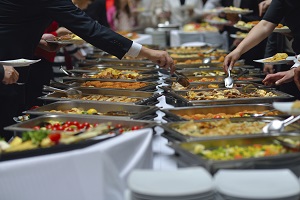When searching for a catering company, it's wise to utilize all of your resources. Ask for recommendations from friends or family, and modern technology can also be a good resource to look for potential catering companies – review their social media sites. Comments left by past clients can be a good indicator of the company's quality.
Budgets & Proposals
The first step before contacting a caterer is to set your budget. Setting a budget will give you a starting point to discuss things with a caterer. Decide your event must-haves, and figure out how they fit into your budget.
When contacting a caterer, make sure to explain your budget and event requirements thoroughly. Be sure to describe your event consistently when contacting multiple caterers; leaving out any details could result in price disparities or misunderstandings down the road. Don't be afraid to ask for a detailed proposal. This will allow you to make apples-to-apples comparisons, and it's a good way to make sure your caterer understands the needs of your event.
Don't be afraid to ask in-depth questions along the way as they can make a huge difference in pricing. For example, two catering companies may charge the same price for certain dishes. However, one company may use less expensive frozen ingredients, while another company uses more expensive fresh ingredients.
Your main goal through this process is to receive apples-to-apples comparisons. After receiving multiple proposals for your event, check each line item for comparisons. If you see a disparity between two similar line item prices, figure out why they are being priced differently. For example, specialty drink prices with the same ingredients can vary according to how they are served. Drinks being served from the bar are often cheaper than drinks being served to each table. Look at what you're getting for the cost. It's easy to compare prices, but you may not be happy with the level of quality offered by the cheapest option. It's never a bad idea to do your homework.
Unexpected Costs
Make sure the proposals you receive include all event costs. Sometimes a proposal can leave out costs such as taxes, service fees, and gratuity.
Taxes: It's easy to forget that taxes are tacked onto almost every product and service provided by a caterer – and these tend to add up. These fees vary by state, and can be relatively substantial (10-20%).
Service Fees: Sometimes a catering venue will add a service charge for administering a wedding or event. This money is not distributed as a tip to employees, and can often come as a surprise if not included in your initial proposal's pricing. Sometimes service fees are negotiable – check before signing any contract.
Gratuity: Not a mandatory cost by any means, but still something to consider in your event's overall budget. You will likely end up tipping more than you expect – especially if you're hosting a wedding.
Additional Fees: Extra charges that are rarely considered when planning an event include: a cake cutting fee, corkage fees, and parking fees. Catering companies or venues often charge for cutting the wedding cake and passing pieces out to guests. Corkage fees are charges that a restaurant or venue adds when you bring your own beverages to an event. Surprisingly, these fees can also be extended to cakes – a “cakeage fee” can come into play if an outside vendor supplies your wedding cake. Sometimes this fee can end up costing more than your entire cake, so make sure you inquire. Another thing to consider is event parking. Some venues charge astronomical fees for event parking, which isn't something you want to overlook when your RSVP list numbers in the hundreds.
When searching for a catering company, it's important to utilize all of your resources and to check out all options.


